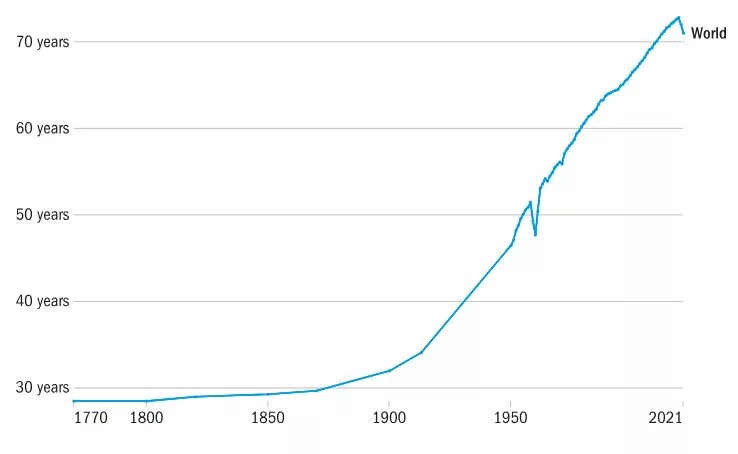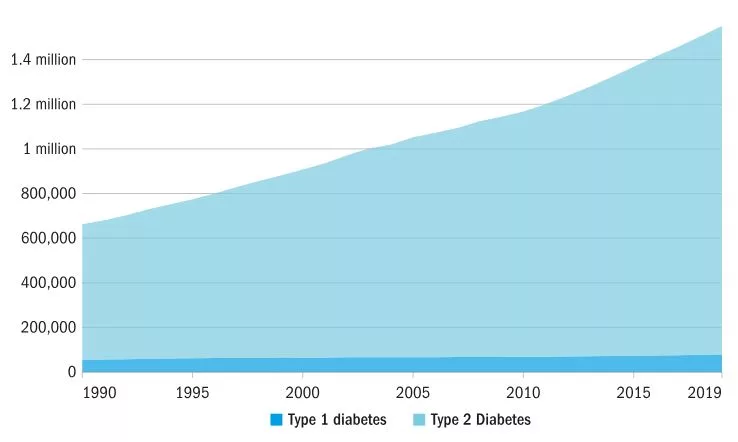Increases in human life expectancy across the globe have been one of the great humanitarian stories in modern history.
At the start of the 19th century, no country in the world had a life expectancy over 40 years old. Now every country on earth does. The average global life expectancy today is higher than the life expectancy in even the healthiest, wealthiest country in 1950.
Life expectancy 1770 to 2021

OurWorldInData.org/life-expectency – CC BY
Note: Shown is the “period life expectancy”. This is the average number of years a newbown would live if age-specific mortality rates in the current year were to stay the same through out its life
It is hard to overstate what a break with the past this is. For millennia, people were trapped in short, truncated lives, generation after generation, unless bouts of war, plague or famine intruded to shorten prospects even further. And then everything changed; starting in the 19th century, massive declines in infant mortality, improvements in sanitation and access to clean water, antibiotics and vaccines, improvements in food security, all helped us begin to escape the mortality trap, expanding the canvas of human life for successive generations.
Into reverse – what’s going wrong?
But something appears to be changing again. After several centuries of improvement, gains are slowing, especially in developed countries, and in some cases even reversing. About a decade ago, life expectancy gains in the UK began to slow meaningfully, before declining during Covid. The Covid era in the US saw the biggest drop in life expectancies in a century, but even before the pandemic, US life expectancy had been dropping, and people in the US now on average live shorter lives than people in Thailand, Costa Rica, or Turkey, despite vastly higher per capita GDP.
There are many things behind this health stagnation: diet, lifestyle, addiction, and even mental health disorders. Poor diets and low levels of exercise have been big factors behind the huge increase in diabetes in the world. According to the World Health Organisation, the number of people with diabetes rose from 108 million in 1980 to 422 million in 2014. That number is forecast to grow to 640mn by 2040. In America, 11% of the population has diabetes. Globally, an incredible 1 in 10 adults is estimated to suffer from it. These are astronomic numbers, and they have terrible health consequences: people suffering from diabetes are twice as likely to die from heart disease or strokes, and in 2019 it is estimated that 2mn people died from diabetes or related kidney diseases. The key to combating this does not start in a hospital. The next great health leap forward may revolve more around how we live, what we eat, how we exercise.
Deaths from diabetes, by type, World, 1990 to 2019

OurWorldInData.org/life-expectency – CC BY
Note: Shown is the “period life expectancy”. This is the average number of years a newbown would live if age-specific mortality rates in the current year were to stay the same through out its life
Healthy eating
We are invested in Kerry Group, a leader in sustainable nutrition, whose ingredients help their customers sell healthier products, which in turn allows people to have healthier diets. Kerry Group is on the cutting edge of the molecular chemistry of food and drink, and has developed a range of sugar reduction technologies, including natural sweeteners and sugar replacers, which reduce one of the key dietary drivers of type 2 diabetes. Their natural sweetener Tastesense Advanced reduces sugar levels in foods and drinks by as much as 50%, so that consumers can retain the flavours they like, without the same attendant health risks. Kerry has developed products that reduce the fat in ice cream, the salt in French Fries, and the sugar in Fanta. These are helping to strip out the raw ingredients that are leading contributors to poor diets, diabetes, cardiovascular disease, and a whole host of other life-threatening conditions that have slowed down the global drive towards longer, healthier lives.
Addressing antimicrobial resistance
Further up the value chain, new addition to the fund Zoetis is taking steps to secure the health and security of our food supply at source. Zoetis is a global leader in developing and commercialising vaccines, medicines and diagnostics for companion animals and livestock. But its work is also pivotal in promoting human health. Excessive use of antibiotics in livestock can lead to bacteria in those animals becoming resistant to antibiotics, and once those bacteria spread to humans through contact with animal products, they can be extremely difficult and dangerous to treat. The US Centres for Disease Control and Prevention classifies antimicrobial resistance as an urgent global public health threat that kills significant numbers of people around the world each year.
Zoetis works to keep unnecessary antibiotics out of the food chain, for example by extensively vaccinating animals, removing the need for subsequent treatment with antibiotics. Zoetis also does not sell medically important antibiotics for growth promotion in animals anywhere in the world. They conduct surveillance for antimicrobial resistance in pathogens that threaten the health of animal species, to help make sure antibiotics continue to work effectively, protecting human health.
Zoetis also understands that animal and human health are highly interdependent. According to the WHO, at least 75% of emerging infectious diseases have an animal origin. Zoetis monitors approximately 200 diseases identified by WHO as being shared between animals and humans, and has developed or supported vaccines for high-impact emerging diseases around the world, including Avian Influenza, Porcine Epidemic Diarrhea Virus, Canine Influenza, Rabies and Lyme disease. Thus, through its vaccination programmes Zoetis is on the forefront of patrolling the boundaries between animal and human disease.
On your bike
And of course, better health is not simply about what we put into our bodies, but also about how we exercise them. Sitting on the boundary between multiple sustainability thematics, Shimano is the world’s leader in manufacturing gears and brakes for bicycles, and therefore a key enabler of exercise. It is hard to overstate how important this is to healthy living. Dr Peter Attia, an expert in the science of longevity, says: “Exercise is by far the most potent longevity drug…The data are unambiguous: exercise not only delays actual death but also prevents both cognitive and physical decline better than any other intervention.”
Cycling can be a key part of this exercise make-up, with studies showing that regular cycling can decrease your risk of cardiovascular disease by up to 50%, as well as reducing symptoms of depression and anxiety. Through its R&D leadership, Shimano has a relentless focus on improving the quality, safety, and durability of its products, and has built up a dominant market share and brand positioning within the world of cycling that is almost unique in the consumer space.
The mention of any specific shares should not be taken as a recommendation to deal. Columbia Threadneedle Investments does not give any investment advice.
A structural megatrend with multiple benefits
Humanity has made strides in health and life-expectancy that would have staggered our ancestors, but there is no space for complacency. Companies will play a pivotal role in developing the foods, pharma and lifestyle products that don’t just patch up illnesses when they appear but help to prevent them from occurring in the first place. We want to be invested in these innovative, impactful businesses, because of the durability of demand for their products and services, but also because they can help lead the drive towards not just longer lives, but healthier ones.

